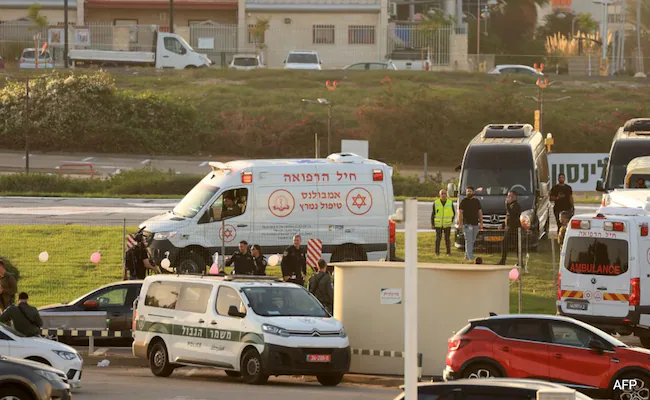24 Hostages Released By Hamas Nearly 2 Months After War Began
Hamas on Friday freed a first batch of hostages seized in the deadliest attack in Israel’s history under a deal that saw a temporary truce take hold in war-ravaged Gaza.
Thirteen Israeli hostages captured during Palestinian militants’ murderous October 7 cross-border raids were handed over to their country’s security forces, an Israeli security source said.
It came after Hamas sources told AFP the hostages had been transferred to the Red Cross to be taken to the Rafah border crossing between Gaza and Egypt. AFPTV live footage showed Red Cross jeeps entering the crossing with passengers on board, some of them waving.
The first group of women and child hostages were set to return to Israel under a deal that followed weeks of talks involving Israel, Palestinian militant groups, Qatar, Egypt and the United States.
Israel is set to release three times as many Palestinian prisoners from Israeli jails — women and teenage boys.
Key mediator Qatar confirmed Hamas had on Friday released a total of 24 hostages and that Israel had freed 39 women and children from its prisons.
“Those released include 13 Israeli citizens, some of whom are dual citizens, in addition to 10 Thai citizens and a Filipino citizen,” its foreign ministry spokesperson Majed Al Ansari said.
A White House official said “we do not expect Americans to be among the first group released today but remain hopeful that there will be Americans among the 50 released”.
Pictures released earlier by the Israeli army showed bright pink and blue headphones sitting on the seats of a helicopter ready for the released hostages to use, along with toys and teddy bears waiting at a reception centre where they were being taken to.
During a four-day truce, at least 50 hostages are expected to be freed, leaving an estimated 190 in the hands of Palestinian militants.
In exchange, 150 Palestinians prisoners are expected to be released.
Hamas broke through Gaza’s militarised border with Israel on October 7 to kill, according to Israeli officials, about 1,200 people and seize around 240 Israeli and foreign hostages.
‘Going home’
The pause in fighting triggered a mass movement of thousands of Gazans who had sought refuge in schools and hospitals from relentless Israeli bombardment begun after the October 7 attacks by Hamas militants.
“I’m going home,” Omar Jibrin, 16, told AFP after he emerged from a hospital in the south of the Gaza Strip where he and eight family members had sought refuge.
In Khan Yunis, in southern Gaza where many Palestinians fled, a cacophony of car horns and ambulance sirens has replaced the sound of war.
For Khaled al-Halabi, the truce is “a chance to breathe” after nearly seven weeks of war.
Halabi had taken refuge in Rafah but is from Gaza City in the north, much of which has been reduced to rubble.
Israel’s retaliatory air, artillery and naval strikes alongside a ground offensive have killed about 15,000 people, the Hamas government in Gaza said.
Gazans have struggled to survive with shortages of water and other essentials. Trucks carrying more aid, including fuel, gas, and food, began moving into Gaza from the Rafah crossing with Egypt shortly after the truce began at 7:00 am.
Jens Laerke, spokesman for the United Nations humanitarian agency, OCHA, expressed hope in Geneva that the pause “leads to a longer-term humanitarian ceasefire for the benefit of the people of Gaza, Israel and beyond.”

